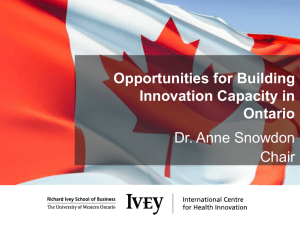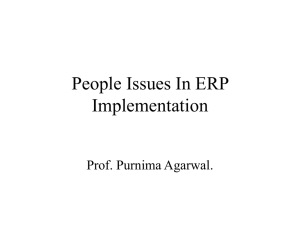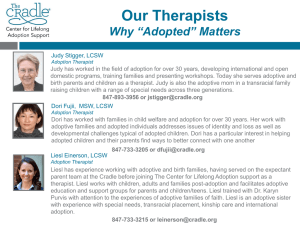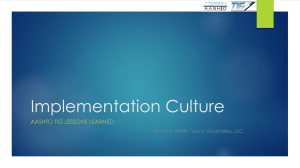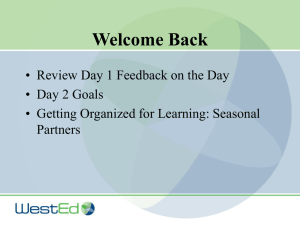Session Two Core Clinical Issues in Adoption Power Point
advertisement
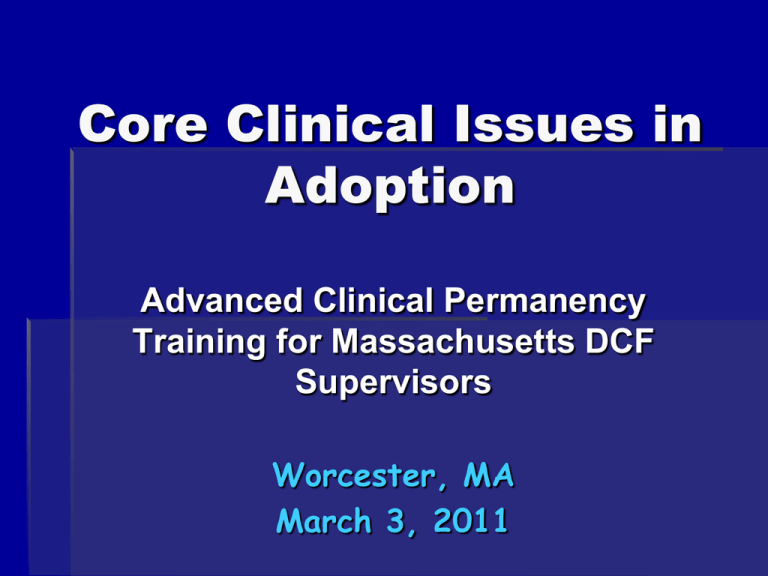
Core Clinical Issues in Adoption Advanced Clinical Permanency Training for Massachusetts DCF Supervisors Worcester, MA March 3, 2011 Every clinician is in post adoption practice – Ann Hartman Language in the Context of Adoption Members of the Adoption Constellation - Birth Parent/Family – Mothers and Fathers extended family, grandparents - Adopted Person - Adoptive Parent/Family An Overview of Some Adoption Issues Careful matching to avoid “detection” Child’s status hidden as were parent’s infertility issues Birth mother excluded from knowing where her child was placed – encouraged to “get on with her life” Needs of birth fathers rarely addressed An Overview of Some Adoption Issues Adopted parents received very little information about the child or his/her history Help the family “claim” the child as their own Adoption workers had to find the “right” family Many workers used their “own values” to guide this process An Overview of Some Adoption Issues Deserving Adoptive Parents were married couples, infertility issues, financially stable, usually white Foster parents, single parents, non married couples, relatives not deemed appropriate Secrecy was key to success An Overview of Some Adoption Issues Worker is “expert;” Birth family is “dangerous or deviant;” Adoptive family is “appropriate;” Child is best served as if they were born into the family Historical Shifts Myths that Continue Paradigm shift from secrecy to openness Adoption is the same as being in a birth family Triad members need to be protected Everyone should move on Win/Win/Win situation Genetic information is not relevant Adoptive Families and Social Services What happens after finalization? Is permanency a panacea? Most commonly cited identified need by professionals and parents was for qualified, adoption sensitive mental health professionals Adoptive Families and Social Services Services sought in one Illinois study were: Individual counseling for the child (68%) Family counseling (35%) Individual Counseling for the parent(s) (31%) Parent support groups (15%) Support groups for children (10%) 26% of children were hospitalized 10% had formal placement outside of home Families Report that Helping Professionals: View family as pathological, sometimes questioning parent’s motivation in adoption; Imply that the parent is blaming the child for family problems when the parent raises the need to discuss adoption as part of the treatment; Lack of awareness of cross racially, older children and those adopted in sibling groups; Families Report that Helping Professionals: Advise parents to avoid talking about adoption as it will only “stir things up;” Address child behavior problems through behavioral methods without exploring how these behaviors may be connected to past deprivation, trauma or adoption; Urge hospitalization without understanding the underlying effects of separation for children affected by adoption; Families Report that Helping Professionals: Failed to understand the child welfare system; Suggest that the parents “just got a bad one” and urge families to return the child to the state. Shawn’s Family Adoptive parents (Pete and Mary Simmons, ages 37 & 39 years, married ten years) became foster parents of Shawn when he was twelve years-old, he is now 15 years old. Shawn was born to a young teen-aged mother who left him with her own mother, who cared for him for eight years and then upon her death, he was placed in the foster care system. Timothy was neglected by grandmother who also abused drugs. Many reports of neglect were filed with the parish. At the time of his first placement, Timothy was described by the foster parents as depressed, sad, and anxious – unable to tolerate being hugged. Birth mother voluntarily relinquished her parental rights, and the rights of birth father (who had not been involved in Shawn’s life) were terminated. The first foster parents were unwilling to adopt Shawn, once he had been freed up for adoption. The Simmons family was identified as a good match for Timothy – they were interested in adopting a teen, Mr. Simmon’s knew Shawn from the high school where he taught Science and they had a good relationship. Shawn’s Family con’t The Simmon’s are concerned about the recent behavioral difficulties shown by Shawn – initially he seemed to be so happy in his new home, now he is challenging their authority, coming in late, and possibly experimenting with alcohol and other substances. They are particularly concerned about his recent refusal to go to school. Adoptive Parents’ Brief Report of Recent History: The Simmon’s describe the adoption of Timothy as a “gift” since they had struggled with fertility issues for ten years before becoming his foster parents. Mr. Simmon felt that since he knew Shawn before he came to live with them that Shawn would respond well to their family. They felt that since his life had been so hard, that they would not lay down too many rules for him. Onset of Problems with Shawn: The problems began when Shawn felt junior high and entered high school. Therapeutic Intervention: Shawn’s Family con’t Therapeutic Intervention: Shawn was referred by a high school guidance counselor to a therapist in the community. The therapist had a psychoanalytical orientation, never asked to see the parents separately or with Shawn, and never asked about Shawn’s birth family. Shawn was referred to weekly drug testing, after school help, and after three weeks of sessions refused to go to therapy. Family Expectations: What was the family’s initial experience of adoption? What were the parent’s dreams? When did the dreams begin to disintegrate? How, specifically, did the reality differ from the dream? What were the consequences of adopting this child? Family Expectations: How did Shawn behave in his adoptive family? How did Shawn’s parents originally interpret this behavior? How did the first professional react? How did the parents explain Shawn’s behavior? What help was offered? Context of Adoption in Therapy When adoption comes into play Presenting problem Not presenting problem but primary issue Additional layer of complexity to an issue Pitfalls for Therapists All or nothing Therapist’s counter-transference The best solution is to disrupt the adoption Adoption work is short-term Family-Systems Approach Collaborative Non-pathological model Doesn’t foster secret/collusive relationships- in the spirit of full and open disclosure Includes all constellation members: birth and adoptive parents and adopted persons Includes the family system in the process Behavioral Issues and Underlying Emotional Issues: Attachment, Separation, & Grief Identity Issues and the Need to Search Depression PTSD Core Issues of Adoption Adoption is Different Than Birth Adoption is a Life Long Process The Effects of Loss Core Issues of Adoption The Effects of Previous Maltreatment on Family Functioning Issues in Attachment Identity Issues Mastery and Control Issues Core Issues of Adoption Adoption is Different Than Birth Challenges to family functioning and child well-being – time, biology, history “Real” parents verses adoptive parents Parents need to be seen as allies in the therapeutic process Core Issues of Adoption Adoption is a Life Long Process A process is not a one time event, the adoption itself is a one time event, the effects of living with adoption are life long Adolescence, marriage, child rearing, separation are huge markers Core Issues of Adoption The Effects of Loss Central to adoption process Adoption is not possible without loss Adopted person has loss – genetic identity, loss of relationships with emotionally significant objects Adopted family has loss – infertility; loss of continuity with biological lineage; Birth parents have loss – surrender of child; loss of information about the child Core Issues of Adoption The Effects of Loss Loss is healed through grief Grief is revisited over time Developmental tasks trigger loss – adolescence, marriage, college, childbirth Some behavior in adopted persons viewed as pathological may actually be maladaptive grieving – i.e., concepts of rejection Core Issues of Adoption The Effects of Previous Maltreatment on Family Functioning Maltreatment, trauma, prenatal exposure to substances, deprivation, lack of stimulation; nutritional deprivation; and many others PTSD trauma Sexual abuse Physical abuse Core Issues of Adoption The Effects of Previous Maltreatment on Family Functioning “This is my dilemma. When I think of the abuses heaped on my child by her birth parents, and all the struggles she had as a result, it is hard for me not to hate them for the harm they caused. On the other hand, if they hadn’t hurt her, she wouldn’t have been taken away, and she wouldn’t be my daughter. And if it weren’t for them, she wouldn’t look the way she does, have many of the talents that she does. It’s complicated.” – Adopted Mom Core Issues of Adoption Issues in Attachment Cycle of need and response Infant basic needs/keep caretaker close FAS – attachment challenges Trust, intimacy, caretaker dependability Core Issues of Adoption Issues in Attachment Dependency needs may be greater than parent’s ability – black hole – sieve syndrome Attachment is on a continuum Attachment is a two way street Ability to attach complicated by physical or temperamental differences Core Issues of Adoption Issues in Attachment Adoptive parents with attachment issues may believe that such a mismatch would never have occurred with a child born to them. Core Issues of Adoption Identity Issues Both adopted parents and adopted persons must incorporate “being adopted” into their sense of self. Who am I? Where do I come from? How does this impact on my life? Openness is key Be comfortable with ambiguity Core Issues of Adoption Mastery and Control Issues Basic need for competence and personal power in one’s life Control over one’s life; control over creating family; control over one’s child by birth Control battles are common in adoptive families as each party seeks to gain control over their lives and situations Core Issues of Adoption Loss Adopted Person Fear ultimate abandonment; loss biological, genetic, cultural, history. Issues of holding on and letting go Adoptive Parent Infertility equated with loss of self & immortality. Issues of entitlement lead to fear of loss of child and overprotection Core Issues of Adoption Loss Birth Parent Ruminate about lost child. Initial loss merges with other life events; leads to social isolation; changes in body and self-image; relationship losses Core Issues of Adoption Rejection Adopted Person Personalize placement of adoption as rejection; issues of self-esteem; can only be chosen if first rejected. Anticipate rejection; misperceive situations. Adoptive Parent Ostracized because of procreation difficulties; may scapegoat partner; expect rejection; may expel adopted person to avoid anticipated rejection. Core Issues of Adoption Rejection Birth Parent Reject selves as irresponsible, unworthy because they allowed adoption; turn these feelings against self as deserving rejection; come to expect and causes rejection Core Issues of Adoption Guilt/Shame Adopted Person Deserving of misfortune’ shame of being different; may take defensive stance/anger. Adoptive Parent Shame of infertility; may believe childlessness is curse or punishment; religious crisis. Core Issues of Adoption Guilt/Shame Birth Parent Party to guilty secret; shame/guilt for placing child; judged by others; double bind; not OK to keep child and not OK to place them either. Core Issues of Adoption Grief Adopted Person Grief may be overlooked in childhood; blocked by adult leading to depression or acting out; may grieve lack of fit in adoptive family. Adoptive Parent Must grieve loss of fantasy child; unresolved grief may block attachment to adopted person; may experience adopted person’s grief as rejection. Core Issues of Adoption Grief Birth Parent Grief is acceptable only for a short period but may be delayed 10-15 years; lack rituals for mourning; sense of shame blocks grief work. Core Issues of Adoption Identity Adopted Person Deficits in identity may impede integration of identity; may see search for identity in early pregnancies; extreme behaviors in order to create sense of belonging. Adoptive Parent Experiences diminished continuity of self; they are not “real” parents. Identity Adopted Person Issues More identities to process Over identifying more with one family Fantasizing, distracted in school, angry Feeling marginalized Lack of identity markers Complicates independence phase Control Core Issues of Adoption Identity Birth Parent Child is part of identity and goes on without birth parent’s knowledge; diminished sense of self and selfworth; may interfere with future paternal desires. Core Issues of Adoption Intimacy Adopted Person Fear getting close and risk re enacting earlier losses; concerns over possible incest; bonding issues may lower capacity for intimacy. Adoptive Parent Unresolved grief over losses may lead to intimacy or marital problems; may avoid closeness with adopted person to avoid loss. Core Issues of Adoption Intimacy Birth Parent Difficulties resolving issues with other birth parent may interfere with future relationships; intimacy may equate with other losses. Core Issues of Adoption Control Adopted Person Adoption alters life course’ not party to initial decisions; haphazard nature of adoption removes cause and effect continuum. “Control Freak” “Victim” “Being Stuck” Adoptive Parent Adoption experiences lead to learned helplessness; sense of mastery connected to procreation. Super Parent Issues Core Issues of Adoption Control Birth Parent Relinquishment seen as out of control; interrupts drive for self actualization. Divided Loyalties Adopted Person Issues He/she does not feel free to talk about birthparents May want to connect with birthparents All adopted persons search Search and reunion and separate functions Parent Issues Create loyalty issues by denying significance of birth parent Entitlement & Gratitude Adopted Parent Issue Infertility issues Can’t assume they know their child Have to prove they are worthy or “perfect” parents Existence of birthparents Plays out in discipline, boundaries or lack thereof Depression Entitlement & Gratitude Child Issues May not feel he/she may show negative traits or behavior May feel compelled to try to be “perfect” & full of gratitude Behavioral Issues and Underlying Emotional Issues: Attachment, Separation, & Grief Identity Issues and the Need to Search Depression PTSD We Never Thought it Would be Like This! Problems Identified by Families Behavior problems of child Emotional problems of child Child-Parent relationship Child’s relationship w/ peers Financial problems Child care problems Emotional problems – parent Job problems Marital problems Unresolved infertility 89% 72% 61% 48% 46% 37% 26% 25% 24% 21% We Never Thought it Would be Like This! Problems Identified by Families Common Themes Limited Emotional Range – anger/sorrow Marital Tensions Sibling Issues We Never Thought it Would be Like This! Problems Identified by Families Common Themes Isolation Exhaustion and Hopelessness Running on Empty Strategies for Adoptive Parents By Developmental Stage Infancy (0-3) Talk comfortably about adoption from the time the child arrives Start the adoption story from --when you were born, your birth Mom . . . . Not when we adopted you . . . Model correct adoption language Gather as much info about the child’s history when the trail is fresh Strategies for Adoptive Parents By Developmental Stage Pre School (3-7) Encourage questions and answer concretely and simply. Listen for cues about misperceptions when the child is playing or talking with peers. Don’t assume that telling the adoption story every once in a while is adequate. Tell the story positively, but realistically. Reassure the child that they will not lose their adoptive family Strategies for Adoptive Parents By Developmental Stage School Age (8-12) When children are not talking about adoption don’t assume they aren’t thinking about it. Learn to be alert for anniversary reactions – trigger times – mother’s day, birthdays, holidays, loss. Let children know that they can love two sets of parents. Don’t force discussions, look for opportunities, i.e., on a drive in the car, anniversaries Strategies for Adoptive Parents By Developmental Stage Early Adolescence (12-15) Allow the child to exercise control whenever possible. Be firm in limit setting. Try to keep from responding to the child’s anger with more anger. Establish clear consequences for broken rules. Maintain a sense of humor. Strategies for Adoptive Parents By Developmental Stage Late Adolescence (15 - 20) Make it clear that the child may remain home for a time following graduation, i.e. attend college nearby. Be alert for overreactions when relationships with peers fail. Talk openly about dating, intimacy, relationships. Be aware that leaving home, even for college can feel like abandonment all over again. Therapeutic Techniques Parent education - Bibliotherapy Narrative work Parenting that fosters attachment Play therapy Reframing The Adoption story Lifebooks Letter Writing by parent/ by child or teen Journaling Techniques continued Genograms Kid’s Group Parent’s Group Mentoring for kids and parents Guided Fantasy Rituals Search (inside and outside) Facilitated Reunions


